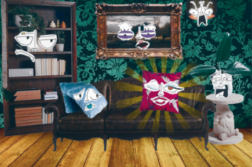Disclaimer: The views expressed within this article are entirely the author’s own and are not attributable to Wessex Scene as a whole.
It is a common sight to any Twitterholic – a Union Jack in a twitter handle. This one small symbol brings with it connotations of patriotism at best and racism at worst – but why has it become this way?
As a centrist caught in the middle of a culture war, the ever-increasing polarisation of society and the hate and anger this causes is an awful shame. What is possibly more upsetting is seeing how the Union Jack has become so synonymous with one faction of this war. However, upon delving deeper, it should not come as a surprise that nationalists hold the flag in such high regard. The flag is a symbol of what was once the most powerful nation, military and empire of all time.
This is something recognised in national polls, where 60% of respondents to a 2012 YouGov Poll associated the Union Jack with the British Empire and over 70% associate it with the armed forces. What is more striking from the poll however is the lack of people that associated the flag with a ‘modern and diverse Britain’, at only 37% of respondents, and that a quarter of Scots associated the flag with ‘racism and extremism’. These statistics suggest a vision of the flag to a majority of British people as a symbol of imperial glory and when used as part of a nationalist agenda, suggests a desire to return to the levels of power and influence Britain once held – and possibly the demographic structure too.
These beliefs stand as a stark contrast to those of the liberal left, who find themselves highly critical of the British Empire and its wrong doings. While it is clear that Britain’s imperial past does not paint us in a good light, these connotations do not have to be the case. What if the left took this symbol of nationalism with its negative connotation and adopted it to show an improving, modernising Britain that is open to all?
The connotations of certain symbols has changed often throughout history. The Swastika for example was once a common religious symbol, before being adopted by the Nazi Party and given the negative connotation that remains to this day. The opposite has happened with the term ‘Snowflake’. Once used as a term to describe younger generations who were perceived as weak or emotionally fragile, the term has began to gain new meaning thanks to Rebecca Solnit (the activist and author who coined the term ‘mansplaining’) who describes how ‘Individually snowflakes are exquisite; together they are superpowers’.
But what have we got in the UK to be proud of?
To me, this is a strange question. We have a huge amount of things to be proud of in this country. Our cultural power is huge. In music for example, the Beatles changed world music and artists like Queen and David Bowie remain crowd favourites even today. Then there is the modern music scene with Harry Styles, Dua Lipa and Lewis Capaldi all in the global top 30. And what about British sport? The Premier League is the world’s most popular football league and Wimbledon is the oldest tennis tournament in the world – and is also one of the largest.
Then we have our institutions. The National Health Service is one thing that nearly all Brits believe in – something that has become increasingly true throughout the pandemic. Even in 2017, just 9% of British adults disagreed with the principle of the NHS being free at the point of delivery and 66% of Brits would be willing to pay more taxes if it meant maintaining the NHS.
Alongside all of this is the British spirit. This goes further than the ability to make small talk about every weather condition – it is an underlying kindness. When an American serviceman broke down outside my parents’ house on a rainy day 15 years ago, he was shocked that my parents came out and invited him inside for a cup of tea. To most of us, this would not be a strange concept, but the serviceman said that such kindness would never have happened if the same happened to him back home.
It is this kindness that we have seen presenting itself even more regularly recently, throughout the national lockdowns. Whether this be the communal spirit to bring food to isolating houses (which I found myself grateful for when I had to isolate following a positive test) or larger acts of kindness – the kinds that are now so common, BBC News has a threaded article on them!
I think it is time that we start associating the red, white and blue of the Union Jack with these things that are worth being proud of, rather than our imperial past. To confirm, I am not aiming to cover up this past, in fact I whole-heartedly believe it should be taught far better both in schools and through media productions, but the Britain I see is one that could be leading the world not in anger and bigotry, but in a positive direction towards a greener and more economically equal future. So, for those who love Britain because of the good in the hearts of its citizens, we should take back control of our flag from the nationalists, protect it from racist connotations and start using it to promote a more modern, inclusive and (most importantly) kind Britain in the future.



